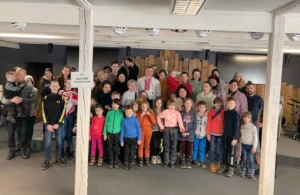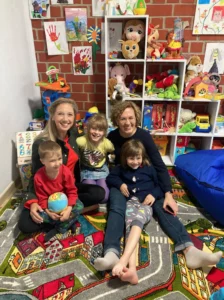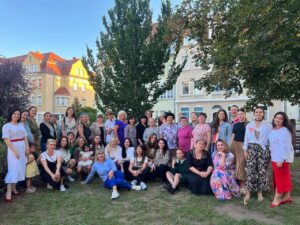

In 2024, after enduring over two years of intensified assaults on the Ukrainian population since the initial invasion in 2014, Ukrainian inhabitants persist in seeking refuge and defending their lives amidst the most significant humanitarian catastrophe in Europe since World War II.
LYNC and Partners continue to assist through multiple channels of relief:
Ukraine faces the world’s oldest humanitarian crisis, including a significant impact on its elderly population due to the ongoing conflict. Mercy Houses provide financial, physical, and emotional assistance, addressing loneliness, medical issues, and financial hardships for older individuals. Focused on rural communities, these houses aim to support the aging population by offering residential space and day-to-day assistance.

Learn more about our Mercy House ministries here.
The “Caring for Ukraine’s Children Through Trauma Healing, Hope and Critical Care” project excitedly marks the next phase of “Rebuilding Ukraine Now.”
By encouraging, equipping, and uniting Ukraine’s frontline workers for children (including but not limited to aid workers, ministry leaders, psychotherapists, teachers, and more) with trauma triage training, creative healing tools, and a retreat forum for the exchange of best practices, we are investing in the wholeness of the next generation of Ukrainian society and leadership.
On a seemingly micro-level, with Kingdom-level anticipation, we serve the smallest and youngest and those who care for them, some of whom we met and spoke with on our recent pre-planning and research trip.
The vision is clear: To brighten the lights of Ukraine’s youngest generation impacted by the war through creative trauma healing, hope, and critical care.

As we did in November 2023 over four days and three nights in central Ukraine, February 8-11, LYNC will again gather 20 pairs (40 participants total + Bautzen team of psychologists) of Ukrainian children’s frontline workers (psychologists and trained ministry leaders operating in IDP centers, churches, etc) for a time of respite and training on the Children & War Foundation curriculum, joined by their Bautzen counterparts with tangible experience leading children and parent groups.
The critical skills training, which includes peer support, healing prayer, and more, will equip participants to return to their regions to operate children’s and parent groups.
In September 2024, the Bautzen team and the 40 participants will reconvene in Central Ukraine. Peer support will form another foundation during these two days: the seeds of a mental health network in the country focusing on children’s trauma triage and a potential future conference integrating LYNC, its partners, international organizations, and global experts to host solutions-focused panels on supporting Ukraine’s next generation as they navigate childhood through war.
LYNC and our partners in Ukraine have nine active children’s trauma healing groups operating in the region.

What was first launched as a piloted innovative art therapy project serving 144 Ukrainian women and teen refugees, the “Hope UA” Women’s Club is financially self-sustaining—just ten months after launching. Read more about it here.
When the first invasion and subsequent occupation of Crimea and Eastern Ukraine occurred in 2014, it was the Ukrainian people who suffered immediately, as it is today. Wade Kusack, Founder of Love Your Neighbor Community (LYNC) , saw the devastation firsthand. He, together with Ukrainian hero and author Serhii Kosiak, mobilized humanitarian networks immediately, creating survival networks for heating wood, food and evacuation post-bombing. The work continues today.
As the world watches images and videos streamed by Ukrainian citizens sheltering and fighting for their lives, the largest scale humanitarian crisis in Europe since WWII continues to unfold. Food and gas shortages, mass infrastructure destruction, military advances, inaccessible banking and more continues to create a highly complex environment for survival. With each night of bombing comes fresh waves of refugees attempting to travel through an ever-shifting security environment to the Western borders of Ukraine. For those who do reach border processing after days of travel, they are met by welcoming, yet grappling host countries. The influx requires both high-level governmental strategy as well as the immediate attention of aid groups and heroic citizens to provide refugee basic needs: food, shelter, clothing and health care. While the Ukrainian refugee needs are unprecedented as a result of the invasion, organizations and individuals with extensive experience and sheer will are rising to assist in the evacuation and resettlement occurring right now.
Ukraine has the highest proportion of elderly individuals impacted by conflict inside a single nation globally. 25% of the country’s population is above the age of 60, however in eastern Ukraine, 33% of those requiring aid since the Russian invasion in 2014 are over 60 years old.
Many of Ukraine’s elderly have no one to assist them. Social security helps with basic needs, but further resources are required to cover individualized care (staff to love, treat, and support them), food, and renovation expenses for housing. We need to cover 2-3 workers per 15 aged individuals in our care to be able to give them the quality of life our hearts long to do.
Your gift will help LYNC and partners provide around-the-clock loving care, food, warmth, and housing renovation to care for these vulnerable and lovely elderly souls left behind.